Managerial Economics Report: Normative Aspects and Business Decisions
VerifiedAdded on 2020/04/15
|12
|2829
|206
Report
AI Summary
This report delves into the realm of managerial economics, emphasizing its normative aspects and practical applications within the business environment. It differentiates between positive and normative economics, highlighting the importance of the latter in managerial decision-making, particularly in areas such as demand analysis and forecasting, production and cost analysis, pricing policies, and profit management. The report underscores the significance of applying economic concepts to real-world business scenarios, including strategy building, cost minimization, and pricing strategies to increase market share and maximize profit. It also discusses the importance of understanding market dynamics and making informed decisions to achieve organizational objectives, making it a crucial resource for students studying managerial economics.
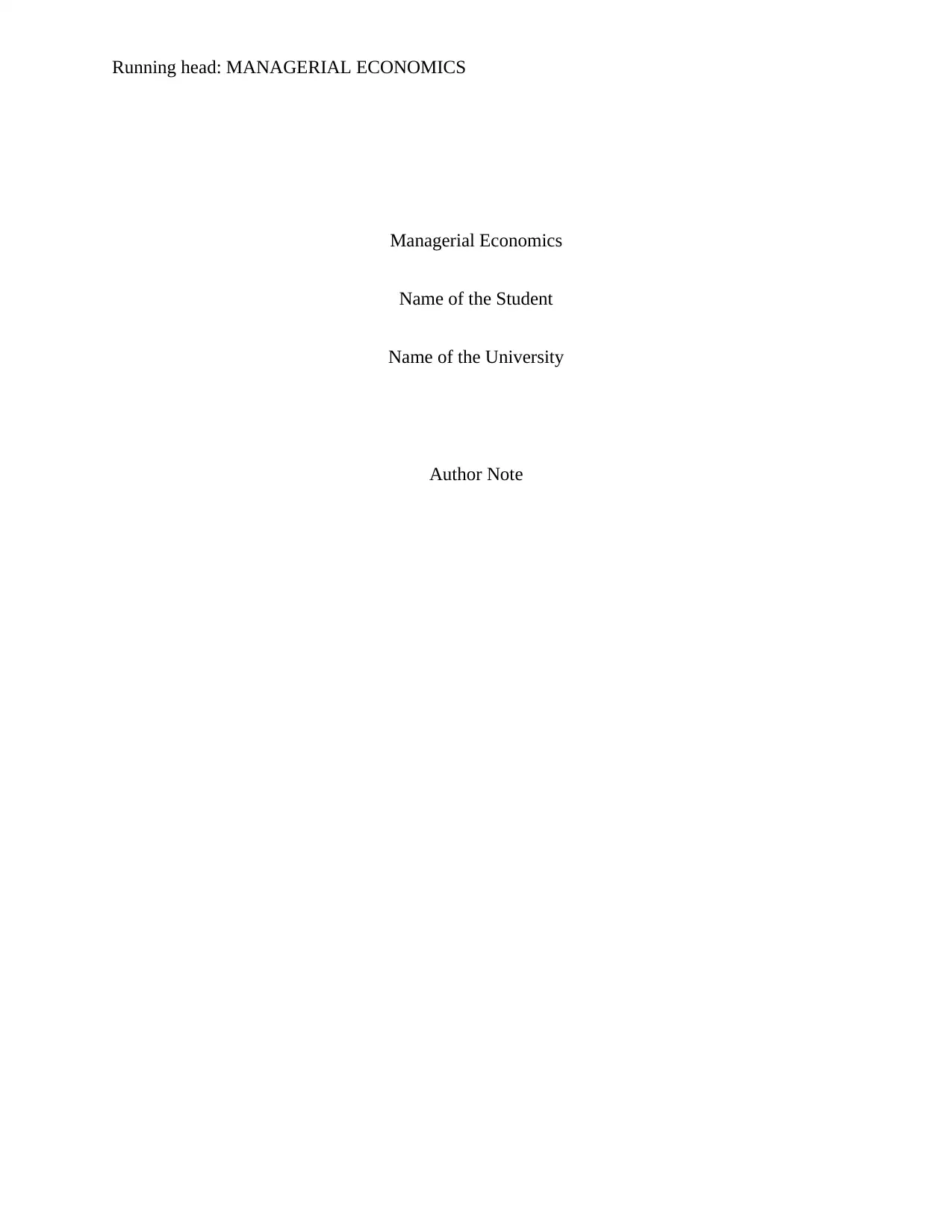
Running head: MANAGERIAL ECONOMICS
Managerial Economics
Name of the Student
Name of the University
Author Note
Managerial Economics
Name of the Student
Name of the University
Author Note
Paraphrase This Document
Need a fresh take? Get an instant paraphrase of this document with our AI Paraphraser
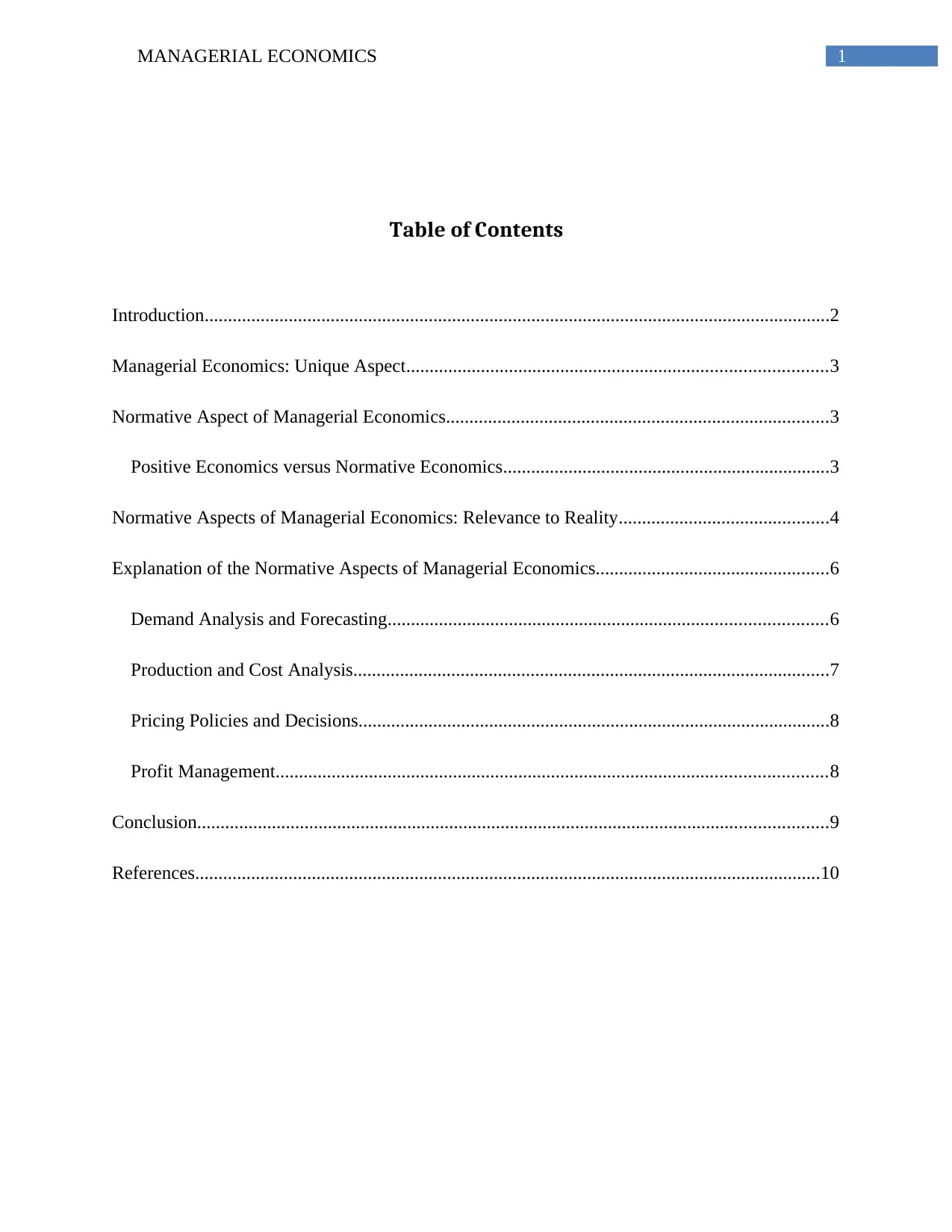
1MANAGERIAL ECONOMICS
Table of Contents
Introduction......................................................................................................................................2
Managerial Economics: Unique Aspect..........................................................................................3
Normative Aspect of Managerial Economics..................................................................................3
Positive Economics versus Normative Economics......................................................................3
Normative Aspects of Managerial Economics: Relevance to Reality.............................................4
Explanation of the Normative Aspects of Managerial Economics..................................................6
Demand Analysis and Forecasting..............................................................................................6
Production and Cost Analysis......................................................................................................7
Pricing Policies and Decisions.....................................................................................................8
Profit Management......................................................................................................................8
Conclusion.......................................................................................................................................9
References......................................................................................................................................10
Table of Contents
Introduction......................................................................................................................................2
Managerial Economics: Unique Aspect..........................................................................................3
Normative Aspect of Managerial Economics..................................................................................3
Positive Economics versus Normative Economics......................................................................3
Normative Aspects of Managerial Economics: Relevance to Reality.............................................4
Explanation of the Normative Aspects of Managerial Economics..................................................6
Demand Analysis and Forecasting..............................................................................................6
Production and Cost Analysis......................................................................................................7
Pricing Policies and Decisions.....................................................................................................8
Profit Management......................................................................................................................8
Conclusion.......................................................................................................................................9
References......................................................................................................................................10
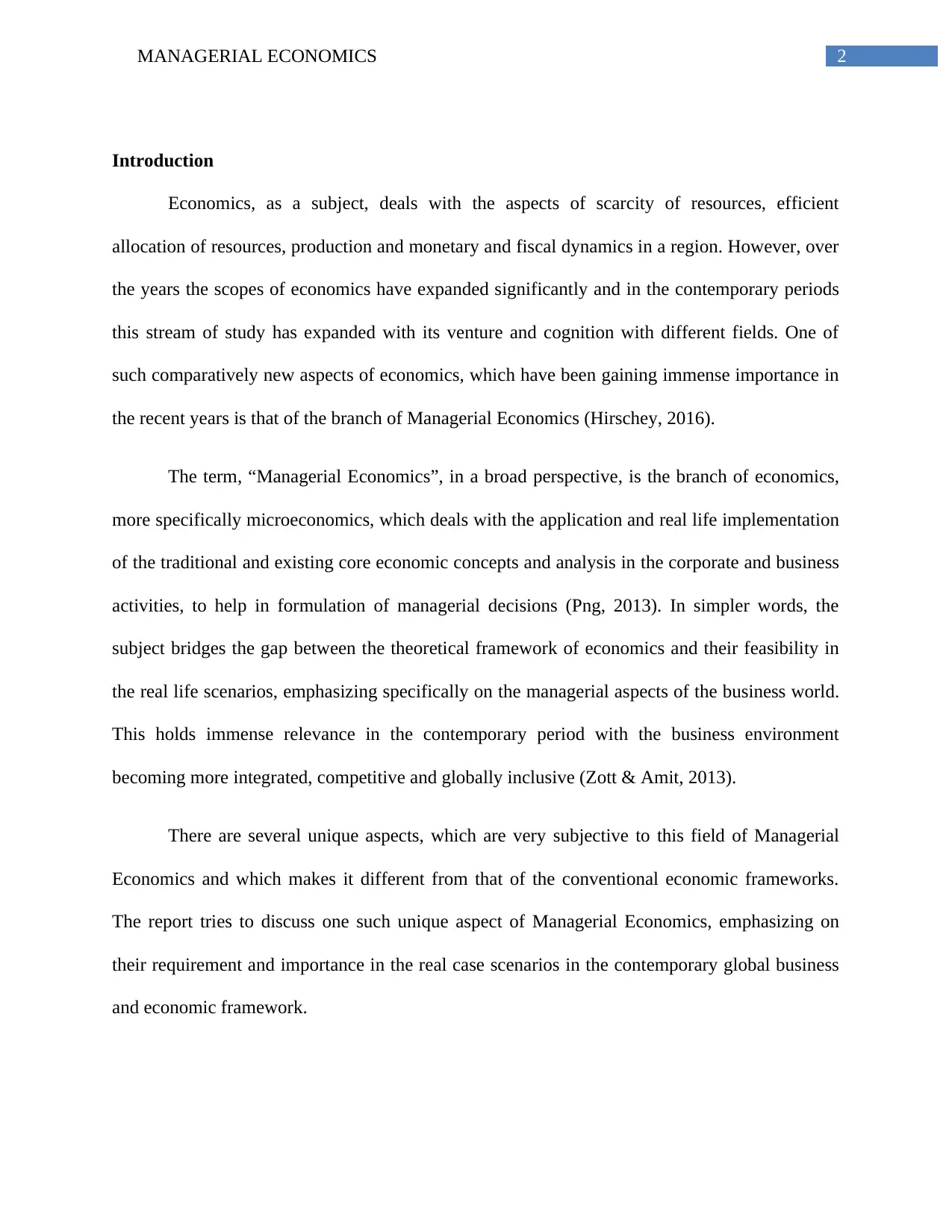
2MANAGERIAL ECONOMICS
Introduction
Economics, as a subject, deals with the aspects of scarcity of resources, efficient
allocation of resources, production and monetary and fiscal dynamics in a region. However, over
the years the scopes of economics have expanded significantly and in the contemporary periods
this stream of study has expanded with its venture and cognition with different fields. One of
such comparatively new aspects of economics, which have been gaining immense importance in
the recent years is that of the branch of Managerial Economics (Hirschey, 2016).
The term, “Managerial Economics”, in a broad perspective, is the branch of economics,
more specifically microeconomics, which deals with the application and real life implementation
of the traditional and existing core economic concepts and analysis in the corporate and business
activities, to help in formulation of managerial decisions (Png, 2013). In simpler words, the
subject bridges the gap between the theoretical framework of economics and their feasibility in
the real life scenarios, emphasizing specifically on the managerial aspects of the business world.
This holds immense relevance in the contemporary period with the business environment
becoming more integrated, competitive and globally inclusive (Zott & Amit, 2013).
There are several unique aspects, which are very subjective to this field of Managerial
Economics and which makes it different from that of the conventional economic frameworks.
The report tries to discuss one such unique aspect of Managerial Economics, emphasizing on
their requirement and importance in the real case scenarios in the contemporary global business
and economic framework.
Introduction
Economics, as a subject, deals with the aspects of scarcity of resources, efficient
allocation of resources, production and monetary and fiscal dynamics in a region. However, over
the years the scopes of economics have expanded significantly and in the contemporary periods
this stream of study has expanded with its venture and cognition with different fields. One of
such comparatively new aspects of economics, which have been gaining immense importance in
the recent years is that of the branch of Managerial Economics (Hirschey, 2016).
The term, “Managerial Economics”, in a broad perspective, is the branch of economics,
more specifically microeconomics, which deals with the application and real life implementation
of the traditional and existing core economic concepts and analysis in the corporate and business
activities, to help in formulation of managerial decisions (Png, 2013). In simpler words, the
subject bridges the gap between the theoretical framework of economics and their feasibility in
the real life scenarios, emphasizing specifically on the managerial aspects of the business world.
This holds immense relevance in the contemporary period with the business environment
becoming more integrated, competitive and globally inclusive (Zott & Amit, 2013).
There are several unique aspects, which are very subjective to this field of Managerial
Economics and which makes it different from that of the conventional economic frameworks.
The report tries to discuss one such unique aspect of Managerial Economics, emphasizing on
their requirement and importance in the real case scenarios in the contemporary global business
and economic framework.
⊘ This is a preview!⊘
Do you want full access?
Subscribe today to unlock all pages.

Trusted by 1+ million students worldwide
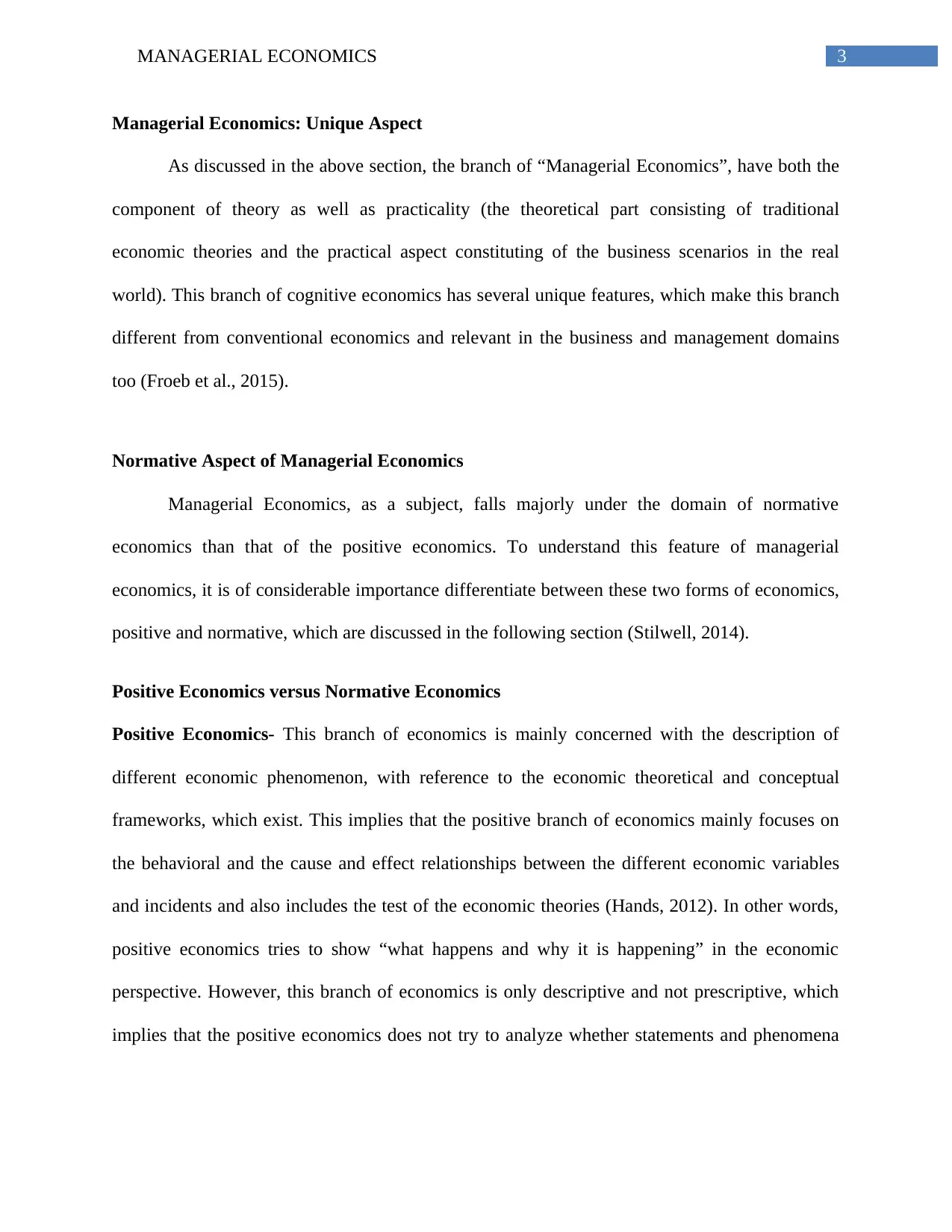
3MANAGERIAL ECONOMICS
Managerial Economics: Unique Aspect
As discussed in the above section, the branch of “Managerial Economics”, have both the
component of theory as well as practicality (the theoretical part consisting of traditional
economic theories and the practical aspect constituting of the business scenarios in the real
world). This branch of cognitive economics has several unique features, which make this branch
different from conventional economics and relevant in the business and management domains
too (Froeb et al., 2015).
Normative Aspect of Managerial Economics
Managerial Economics, as a subject, falls majorly under the domain of normative
economics than that of the positive economics. To understand this feature of managerial
economics, it is of considerable importance differentiate between these two forms of economics,
positive and normative, which are discussed in the following section (Stilwell, 2014).
Positive Economics versus Normative Economics
Positive Economics- This branch of economics is mainly concerned with the description of
different economic phenomenon, with reference to the economic theoretical and conceptual
frameworks, which exist. This implies that the positive branch of economics mainly focuses on
the behavioral and the cause and effect relationships between the different economic variables
and incidents and also includes the test of the economic theories (Hands, 2012). In other words,
positive economics tries to show “what happens and why it is happening” in the economic
perspective. However, this branch of economics is only descriptive and not prescriptive, which
implies that the positive economics does not try to analyze whether statements and phenomena
Managerial Economics: Unique Aspect
As discussed in the above section, the branch of “Managerial Economics”, have both the
component of theory as well as practicality (the theoretical part consisting of traditional
economic theories and the practical aspect constituting of the business scenarios in the real
world). This branch of cognitive economics has several unique features, which make this branch
different from conventional economics and relevant in the business and management domains
too (Froeb et al., 2015).
Normative Aspect of Managerial Economics
Managerial Economics, as a subject, falls majorly under the domain of normative
economics than that of the positive economics. To understand this feature of managerial
economics, it is of considerable importance differentiate between these two forms of economics,
positive and normative, which are discussed in the following section (Stilwell, 2014).
Positive Economics versus Normative Economics
Positive Economics- This branch of economics is mainly concerned with the description of
different economic phenomenon, with reference to the economic theoretical and conceptual
frameworks, which exist. This implies that the positive branch of economics mainly focuses on
the behavioral and the cause and effect relationships between the different economic variables
and incidents and also includes the test of the economic theories (Hands, 2012). In other words,
positive economics tries to show “what happens and why it is happening” in the economic
perspective. However, this branch of economics is only descriptive and not prescriptive, which
implies that the positive economics does not try to analyze whether statements and phenomena
Paraphrase This Document
Need a fresh take? Get an instant paraphrase of this document with our AI Paraphraser
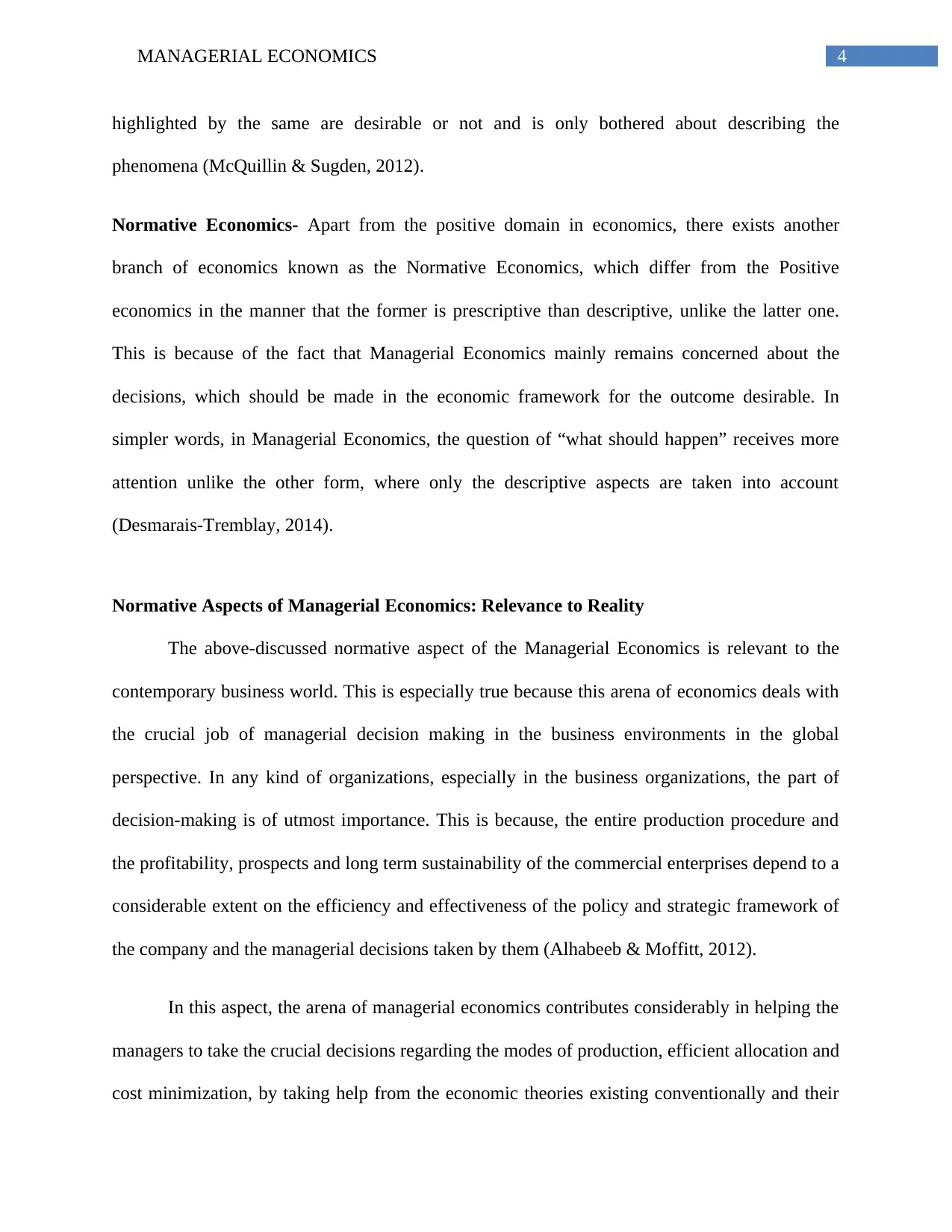
4MANAGERIAL ECONOMICS
highlighted by the same are desirable or not and is only bothered about describing the
phenomena (McQuillin & Sugden, 2012).
Normative Economics- Apart from the positive domain in economics, there exists another
branch of economics known as the Normative Economics, which differ from the Positive
economics in the manner that the former is prescriptive than descriptive, unlike the latter one.
This is because of the fact that Managerial Economics mainly remains concerned about the
decisions, which should be made in the economic framework for the outcome desirable. In
simpler words, in Managerial Economics, the question of “what should happen” receives more
attention unlike the other form, where only the descriptive aspects are taken into account
(Desmarais-Tremblay, 2014).
Normative Aspects of Managerial Economics: Relevance to Reality
The above-discussed normative aspect of the Managerial Economics is relevant to the
contemporary business world. This is especially true because this arena of economics deals with
the crucial job of managerial decision making in the business environments in the global
perspective. In any kind of organizations, especially in the business organizations, the part of
decision-making is of utmost importance. This is because, the entire production procedure and
the profitability, prospects and long term sustainability of the commercial enterprises depend to a
considerable extent on the efficiency and effectiveness of the policy and strategic framework of
the company and the managerial decisions taken by them (Alhabeeb & Moffitt, 2012).
In this aspect, the arena of managerial economics contributes considerably in helping the
managers to take the crucial decisions regarding the modes of production, efficient allocation and
cost minimization, by taking help from the economic theories existing conventionally and their
highlighted by the same are desirable or not and is only bothered about describing the
phenomena (McQuillin & Sugden, 2012).
Normative Economics- Apart from the positive domain in economics, there exists another
branch of economics known as the Normative Economics, which differ from the Positive
economics in the manner that the former is prescriptive than descriptive, unlike the latter one.
This is because of the fact that Managerial Economics mainly remains concerned about the
decisions, which should be made in the economic framework for the outcome desirable. In
simpler words, in Managerial Economics, the question of “what should happen” receives more
attention unlike the other form, where only the descriptive aspects are taken into account
(Desmarais-Tremblay, 2014).
Normative Aspects of Managerial Economics: Relevance to Reality
The above-discussed normative aspect of the Managerial Economics is relevant to the
contemporary business world. This is especially true because this arena of economics deals with
the crucial job of managerial decision making in the business environments in the global
perspective. In any kind of organizations, especially in the business organizations, the part of
decision-making is of utmost importance. This is because, the entire production procedure and
the profitability, prospects and long term sustainability of the commercial enterprises depend to a
considerable extent on the efficiency and effectiveness of the policy and strategic framework of
the company and the managerial decisions taken by them (Alhabeeb & Moffitt, 2012).
In this aspect, the arena of managerial economics contributes considerably in helping the
managers to take the crucial decisions regarding the modes of production, efficient allocation and
cost minimization, by taking help from the economic theories existing conventionally and their
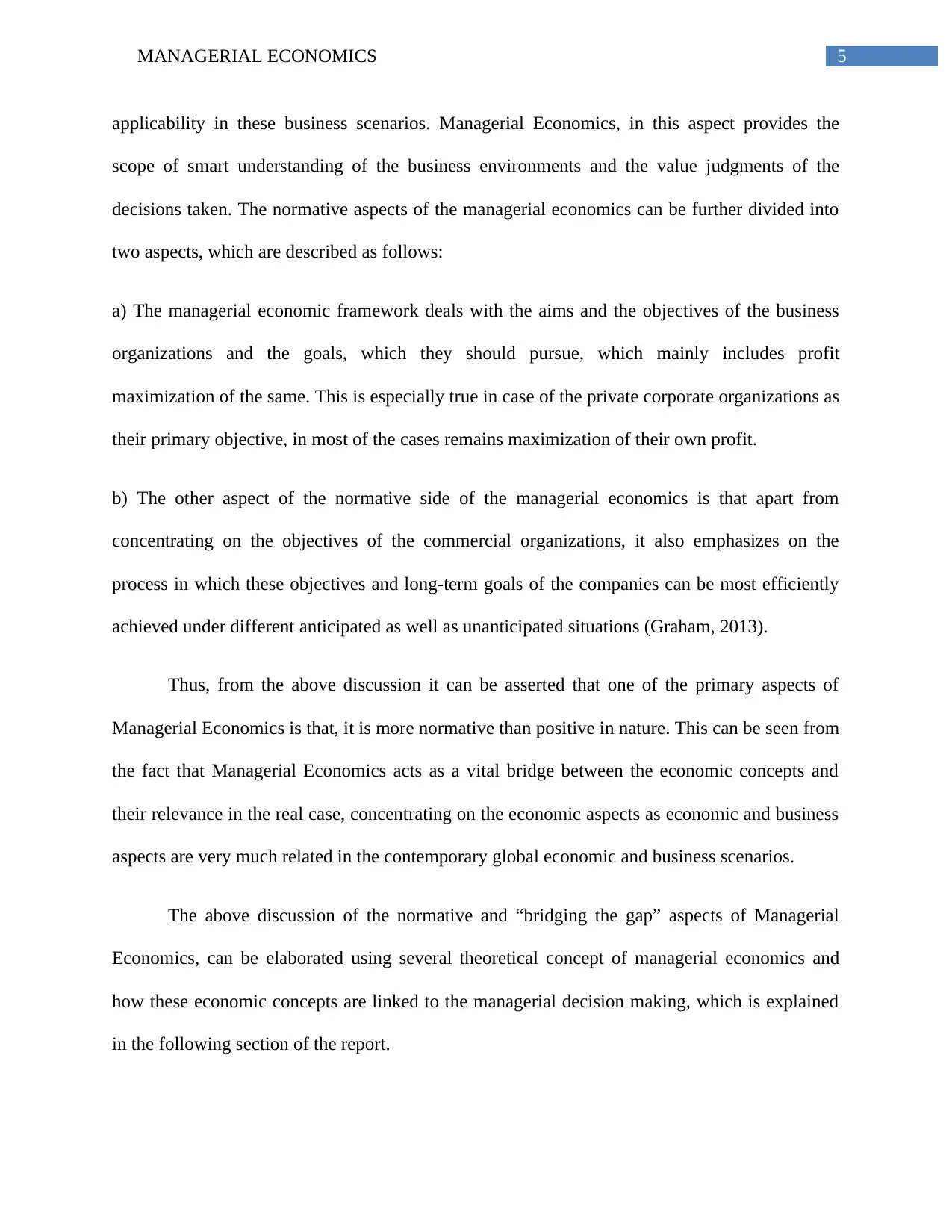
5MANAGERIAL ECONOMICS
applicability in these business scenarios. Managerial Economics, in this aspect provides the
scope of smart understanding of the business environments and the value judgments of the
decisions taken. The normative aspects of the managerial economics can be further divided into
two aspects, which are described as follows:
a) The managerial economic framework deals with the aims and the objectives of the business
organizations and the goals, which they should pursue, which mainly includes profit
maximization of the same. This is especially true in case of the private corporate organizations as
their primary objective, in most of the cases remains maximization of their own profit.
b) The other aspect of the normative side of the managerial economics is that apart from
concentrating on the objectives of the commercial organizations, it also emphasizes on the
process in which these objectives and long-term goals of the companies can be most efficiently
achieved under different anticipated as well as unanticipated situations (Graham, 2013).
Thus, from the above discussion it can be asserted that one of the primary aspects of
Managerial Economics is that, it is more normative than positive in nature. This can be seen from
the fact that Managerial Economics acts as a vital bridge between the economic concepts and
their relevance in the real case, concentrating on the economic aspects as economic and business
aspects are very much related in the contemporary global economic and business scenarios.
The above discussion of the normative and “bridging the gap” aspects of Managerial
Economics, can be elaborated using several theoretical concept of managerial economics and
how these economic concepts are linked to the managerial decision making, which is explained
in the following section of the report.
applicability in these business scenarios. Managerial Economics, in this aspect provides the
scope of smart understanding of the business environments and the value judgments of the
decisions taken. The normative aspects of the managerial economics can be further divided into
two aspects, which are described as follows:
a) The managerial economic framework deals with the aims and the objectives of the business
organizations and the goals, which they should pursue, which mainly includes profit
maximization of the same. This is especially true in case of the private corporate organizations as
their primary objective, in most of the cases remains maximization of their own profit.
b) The other aspect of the normative side of the managerial economics is that apart from
concentrating on the objectives of the commercial organizations, it also emphasizes on the
process in which these objectives and long-term goals of the companies can be most efficiently
achieved under different anticipated as well as unanticipated situations (Graham, 2013).
Thus, from the above discussion it can be asserted that one of the primary aspects of
Managerial Economics is that, it is more normative than positive in nature. This can be seen from
the fact that Managerial Economics acts as a vital bridge between the economic concepts and
their relevance in the real case, concentrating on the economic aspects as economic and business
aspects are very much related in the contemporary global economic and business scenarios.
The above discussion of the normative and “bridging the gap” aspects of Managerial
Economics, can be elaborated using several theoretical concept of managerial economics and
how these economic concepts are linked to the managerial decision making, which is explained
in the following section of the report.
⊘ This is a preview!⊘
Do you want full access?
Subscribe today to unlock all pages.

Trusted by 1+ million students worldwide
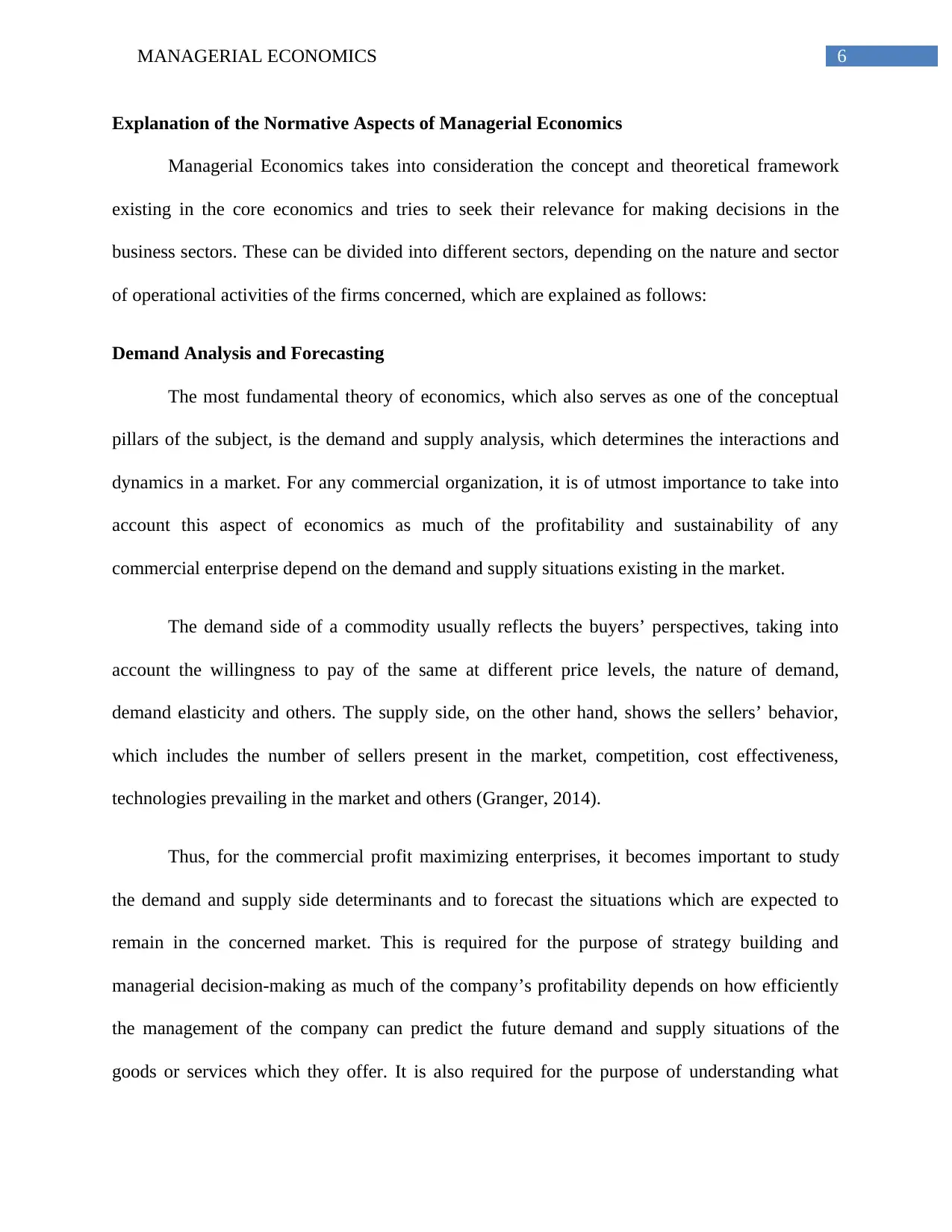
6MANAGERIAL ECONOMICS
Explanation of the Normative Aspects of Managerial Economics
Managerial Economics takes into consideration the concept and theoretical framework
existing in the core economics and tries to seek their relevance for making decisions in the
business sectors. These can be divided into different sectors, depending on the nature and sector
of operational activities of the firms concerned, which are explained as follows:
Demand Analysis and Forecasting
The most fundamental theory of economics, which also serves as one of the conceptual
pillars of the subject, is the demand and supply analysis, which determines the interactions and
dynamics in a market. For any commercial organization, it is of utmost importance to take into
account this aspect of economics as much of the profitability and sustainability of any
commercial enterprise depend on the demand and supply situations existing in the market.
The demand side of a commodity usually reflects the buyers’ perspectives, taking into
account the willingness to pay of the same at different price levels, the nature of demand,
demand elasticity and others. The supply side, on the other hand, shows the sellers’ behavior,
which includes the number of sellers present in the market, competition, cost effectiveness,
technologies prevailing in the market and others (Granger, 2014).
Thus, for the commercial profit maximizing enterprises, it becomes important to study
the demand and supply side determinants and to forecast the situations which are expected to
remain in the concerned market. This is required for the purpose of strategy building and
managerial decision-making as much of the company’s profitability depends on how efficiently
the management of the company can predict the future demand and supply situations of the
goods or services which they offer. It is also required for the purpose of understanding what
Explanation of the Normative Aspects of Managerial Economics
Managerial Economics takes into consideration the concept and theoretical framework
existing in the core economics and tries to seek their relevance for making decisions in the
business sectors. These can be divided into different sectors, depending on the nature and sector
of operational activities of the firms concerned, which are explained as follows:
Demand Analysis and Forecasting
The most fundamental theory of economics, which also serves as one of the conceptual
pillars of the subject, is the demand and supply analysis, which determines the interactions and
dynamics in a market. For any commercial organization, it is of utmost importance to take into
account this aspect of economics as much of the profitability and sustainability of any
commercial enterprise depend on the demand and supply situations existing in the market.
The demand side of a commodity usually reflects the buyers’ perspectives, taking into
account the willingness to pay of the same at different price levels, the nature of demand,
demand elasticity and others. The supply side, on the other hand, shows the sellers’ behavior,
which includes the number of sellers present in the market, competition, cost effectiveness,
technologies prevailing in the market and others (Granger, 2014).
Thus, for the commercial profit maximizing enterprises, it becomes important to study
the demand and supply side determinants and to forecast the situations which are expected to
remain in the concerned market. This is required for the purpose of strategy building and
managerial decision-making as much of the company’s profitability depends on how efficiently
the management of the company can predict the future demand and supply situations of the
goods or services which they offer. It is also required for the purpose of understanding what
Paraphrase This Document
Need a fresh take? Get an instant paraphrase of this document with our AI Paraphraser
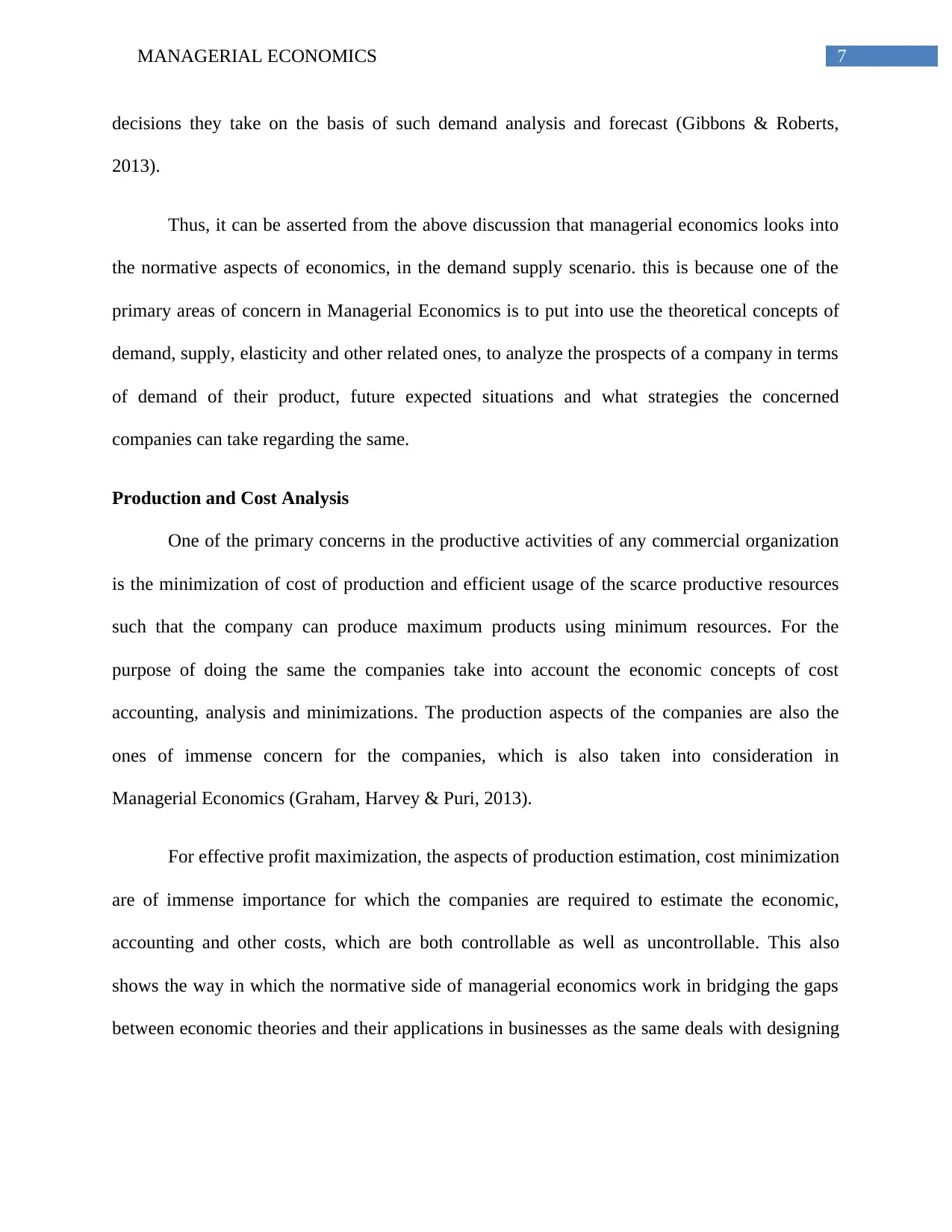
7MANAGERIAL ECONOMICS
decisions they take on the basis of such demand analysis and forecast (Gibbons & Roberts,
2013).
Thus, it can be asserted from the above discussion that managerial economics looks into
the normative aspects of economics, in the demand supply scenario. this is because one of the
primary areas of concern in Managerial Economics is to put into use the theoretical concepts of
demand, supply, elasticity and other related ones, to analyze the prospects of a company in terms
of demand of their product, future expected situations and what strategies the concerned
companies can take regarding the same.
Production and Cost Analysis
One of the primary concerns in the productive activities of any commercial organization
is the minimization of cost of production and efficient usage of the scarce productive resources
such that the company can produce maximum products using minimum resources. For the
purpose of doing the same the companies take into account the economic concepts of cost
accounting, analysis and minimizations. The production aspects of the companies are also the
ones of immense concern for the companies, which is also taken into consideration in
Managerial Economics (Graham, Harvey & Puri, 2013).
For effective profit maximization, the aspects of production estimation, cost minimization
are of immense importance for which the companies are required to estimate the economic,
accounting and other costs, which are both controllable as well as uncontrollable. This also
shows the way in which the normative side of managerial economics work in bridging the gaps
between economic theories and their applications in businesses as the same deals with designing
decisions they take on the basis of such demand analysis and forecast (Gibbons & Roberts,
2013).
Thus, it can be asserted from the above discussion that managerial economics looks into
the normative aspects of economics, in the demand supply scenario. this is because one of the
primary areas of concern in Managerial Economics is to put into use the theoretical concepts of
demand, supply, elasticity and other related ones, to analyze the prospects of a company in terms
of demand of their product, future expected situations and what strategies the concerned
companies can take regarding the same.
Production and Cost Analysis
One of the primary concerns in the productive activities of any commercial organization
is the minimization of cost of production and efficient usage of the scarce productive resources
such that the company can produce maximum products using minimum resources. For the
purpose of doing the same the companies take into account the economic concepts of cost
accounting, analysis and minimizations. The production aspects of the companies are also the
ones of immense concern for the companies, which is also taken into consideration in
Managerial Economics (Graham, Harvey & Puri, 2013).
For effective profit maximization, the aspects of production estimation, cost minimization
are of immense importance for which the companies are required to estimate the economic,
accounting and other costs, which are both controllable as well as uncontrollable. This also
shows the way in which the normative side of managerial economics work in bridging the gaps
between economic theories and their applications in businesses as the same deals with designing
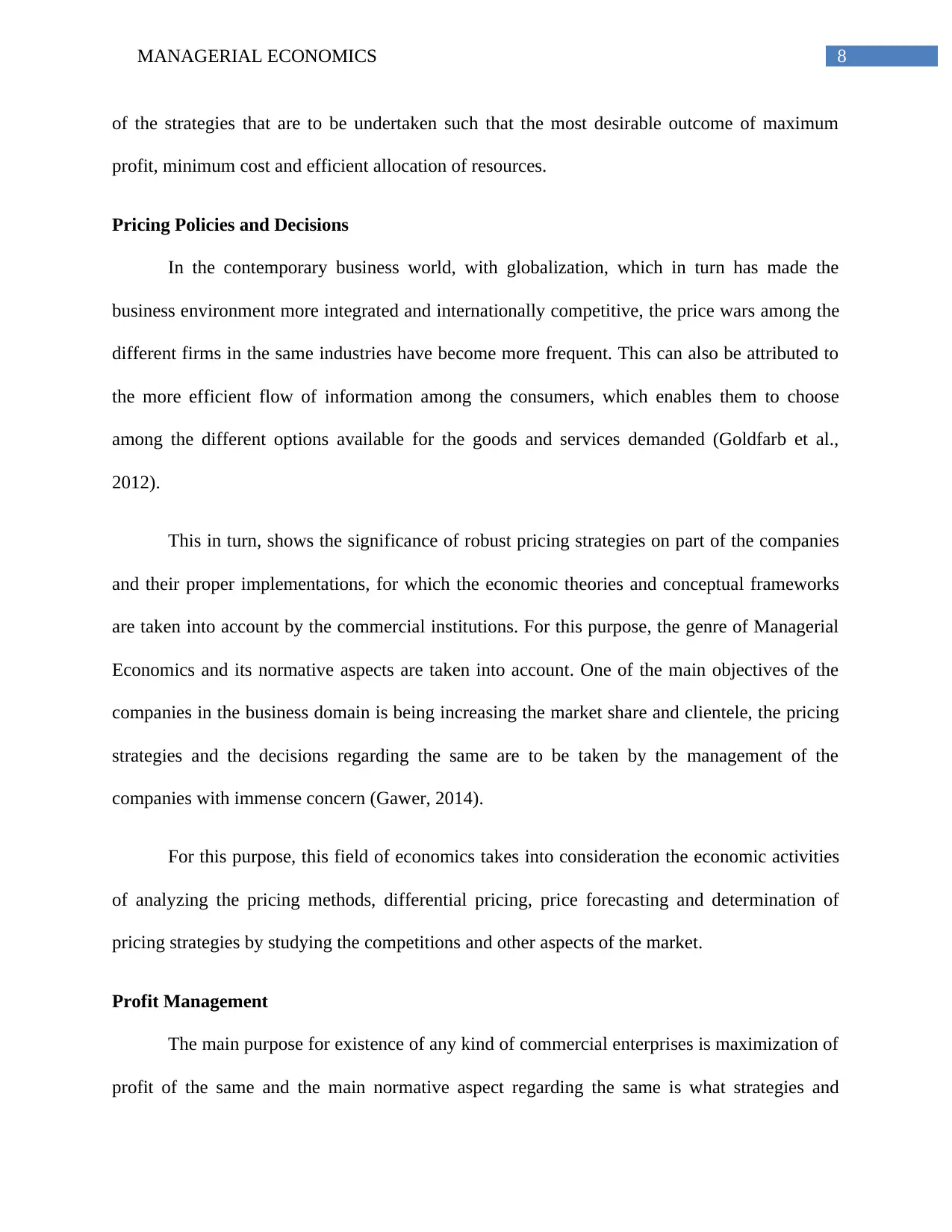
8MANAGERIAL ECONOMICS
of the strategies that are to be undertaken such that the most desirable outcome of maximum
profit, minimum cost and efficient allocation of resources.
Pricing Policies and Decisions
In the contemporary business world, with globalization, which in turn has made the
business environment more integrated and internationally competitive, the price wars among the
different firms in the same industries have become more frequent. This can also be attributed to
the more efficient flow of information among the consumers, which enables them to choose
among the different options available for the goods and services demanded (Goldfarb et al.,
2012).
This in turn, shows the significance of robust pricing strategies on part of the companies
and their proper implementations, for which the economic theories and conceptual frameworks
are taken into account by the commercial institutions. For this purpose, the genre of Managerial
Economics and its normative aspects are taken into account. One of the main objectives of the
companies in the business domain is being increasing the market share and clientele, the pricing
strategies and the decisions regarding the same are to be taken by the management of the
companies with immense concern (Gawer, 2014).
For this purpose, this field of economics takes into consideration the economic activities
of analyzing the pricing methods, differential pricing, price forecasting and determination of
pricing strategies by studying the competitions and other aspects of the market.
Profit Management
The main purpose for existence of any kind of commercial enterprises is maximization of
profit of the same and the main normative aspect regarding the same is what strategies and
of the strategies that are to be undertaken such that the most desirable outcome of maximum
profit, minimum cost and efficient allocation of resources.
Pricing Policies and Decisions
In the contemporary business world, with globalization, which in turn has made the
business environment more integrated and internationally competitive, the price wars among the
different firms in the same industries have become more frequent. This can also be attributed to
the more efficient flow of information among the consumers, which enables them to choose
among the different options available for the goods and services demanded (Goldfarb et al.,
2012).
This in turn, shows the significance of robust pricing strategies on part of the companies
and their proper implementations, for which the economic theories and conceptual frameworks
are taken into account by the commercial institutions. For this purpose, the genre of Managerial
Economics and its normative aspects are taken into account. One of the main objectives of the
companies in the business domain is being increasing the market share and clientele, the pricing
strategies and the decisions regarding the same are to be taken by the management of the
companies with immense concern (Gawer, 2014).
For this purpose, this field of economics takes into consideration the economic activities
of analyzing the pricing methods, differential pricing, price forecasting and determination of
pricing strategies by studying the competitions and other aspects of the market.
Profit Management
The main purpose for existence of any kind of commercial enterprises is maximization of
profit of the same and the main normative aspect regarding the same is what strategies and
⊘ This is a preview!⊘
Do you want full access?
Subscribe today to unlock all pages.

Trusted by 1+ million students worldwide
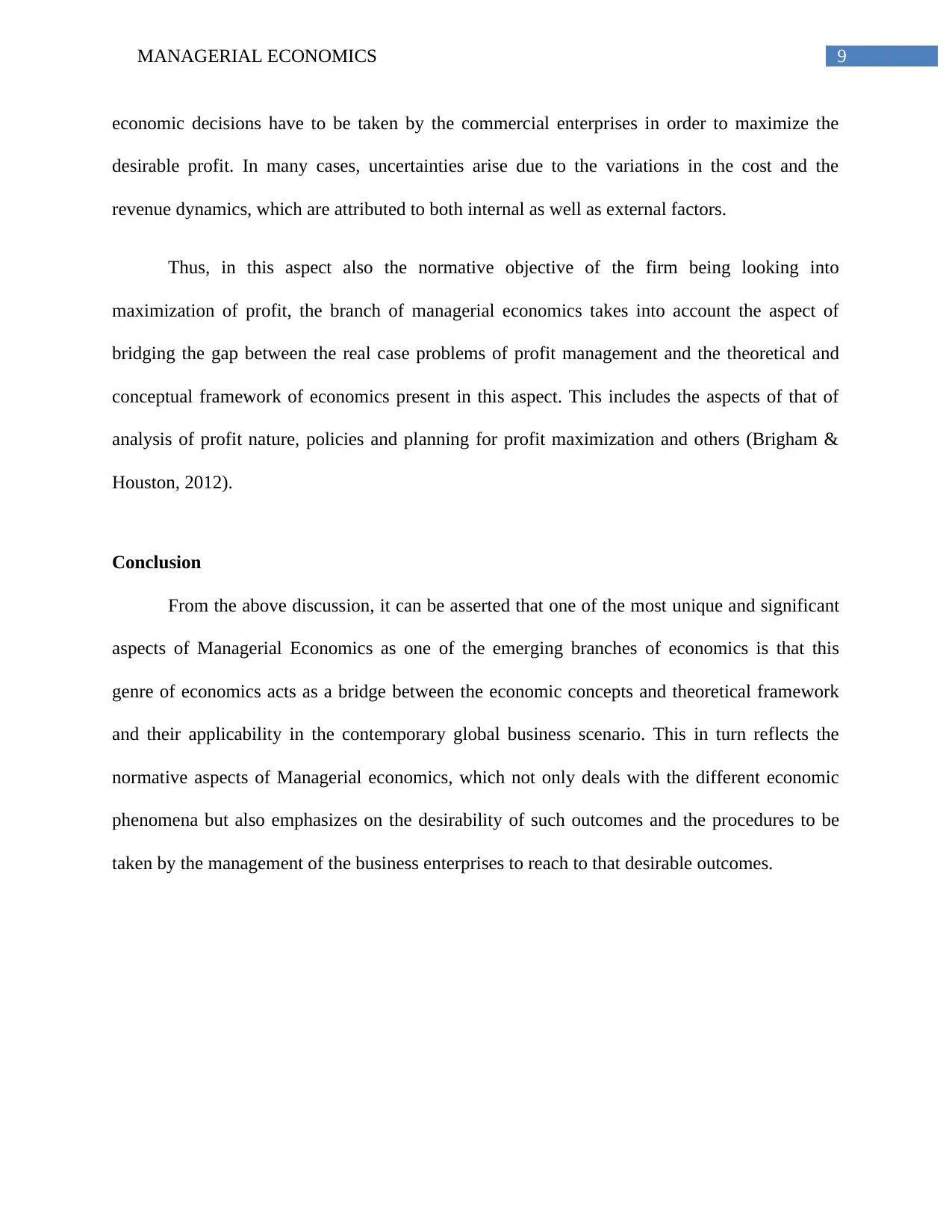
9MANAGERIAL ECONOMICS
economic decisions have to be taken by the commercial enterprises in order to maximize the
desirable profit. In many cases, uncertainties arise due to the variations in the cost and the
revenue dynamics, which are attributed to both internal as well as external factors.
Thus, in this aspect also the normative objective of the firm being looking into
maximization of profit, the branch of managerial economics takes into account the aspect of
bridging the gap between the real case problems of profit management and the theoretical and
conceptual framework of economics present in this aspect. This includes the aspects of that of
analysis of profit nature, policies and planning for profit maximization and others (Brigham &
Houston, 2012).
Conclusion
From the above discussion, it can be asserted that one of the most unique and significant
aspects of Managerial Economics as one of the emerging branches of economics is that this
genre of economics acts as a bridge between the economic concepts and theoretical framework
and their applicability in the contemporary global business scenario. This in turn reflects the
normative aspects of Managerial economics, which not only deals with the different economic
phenomena but also emphasizes on the desirability of such outcomes and the procedures to be
taken by the management of the business enterprises to reach to that desirable outcomes.
economic decisions have to be taken by the commercial enterprises in order to maximize the
desirable profit. In many cases, uncertainties arise due to the variations in the cost and the
revenue dynamics, which are attributed to both internal as well as external factors.
Thus, in this aspect also the normative objective of the firm being looking into
maximization of profit, the branch of managerial economics takes into account the aspect of
bridging the gap between the real case problems of profit management and the theoretical and
conceptual framework of economics present in this aspect. This includes the aspects of that of
analysis of profit nature, policies and planning for profit maximization and others (Brigham &
Houston, 2012).
Conclusion
From the above discussion, it can be asserted that one of the most unique and significant
aspects of Managerial Economics as one of the emerging branches of economics is that this
genre of economics acts as a bridge between the economic concepts and theoretical framework
and their applicability in the contemporary global business scenario. This in turn reflects the
normative aspects of Managerial economics, which not only deals with the different economic
phenomena but also emphasizes on the desirability of such outcomes and the procedures to be
taken by the management of the business enterprises to reach to that desirable outcomes.
Paraphrase This Document
Need a fresh take? Get an instant paraphrase of this document with our AI Paraphraser
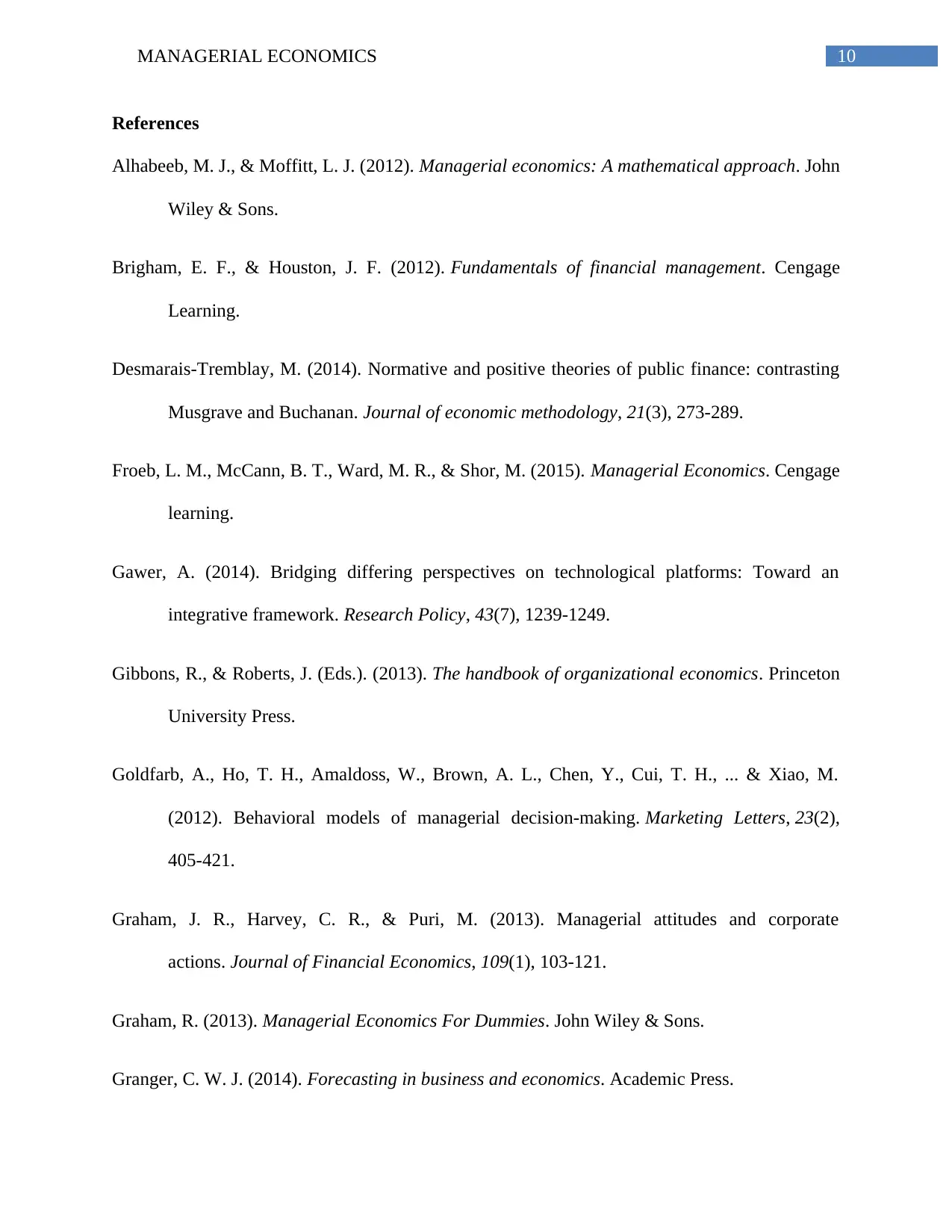
10MANAGERIAL ECONOMICS
References
Alhabeeb, M. J., & Moffitt, L. J. (2012). Managerial economics: A mathematical approach. John
Wiley & Sons.
Brigham, E. F., & Houston, J. F. (2012). Fundamentals of financial management. Cengage
Learning.
Desmarais-Tremblay, M. (2014). Normative and positive theories of public finance: contrasting
Musgrave and Buchanan. Journal of economic methodology, 21(3), 273-289.
Froeb, L. M., McCann, B. T., Ward, M. R., & Shor, M. (2015). Managerial Economics. Cengage
learning.
Gawer, A. (2014). Bridging differing perspectives on technological platforms: Toward an
integrative framework. Research Policy, 43(7), 1239-1249.
Gibbons, R., & Roberts, J. (Eds.). (2013). The handbook of organizational economics. Princeton
University Press.
Goldfarb, A., Ho, T. H., Amaldoss, W., Brown, A. L., Chen, Y., Cui, T. H., ... & Xiao, M.
(2012). Behavioral models of managerial decision-making. Marketing Letters, 23(2),
405-421.
Graham, J. R., Harvey, C. R., & Puri, M. (2013). Managerial attitudes and corporate
actions. Journal of Financial Economics, 109(1), 103-121.
Graham, R. (2013). Managerial Economics For Dummies. John Wiley & Sons.
Granger, C. W. J. (2014). Forecasting in business and economics. Academic Press.
References
Alhabeeb, M. J., & Moffitt, L. J. (2012). Managerial economics: A mathematical approach. John
Wiley & Sons.
Brigham, E. F., & Houston, J. F. (2012). Fundamentals of financial management. Cengage
Learning.
Desmarais-Tremblay, M. (2014). Normative and positive theories of public finance: contrasting
Musgrave and Buchanan. Journal of economic methodology, 21(3), 273-289.
Froeb, L. M., McCann, B. T., Ward, M. R., & Shor, M. (2015). Managerial Economics. Cengage
learning.
Gawer, A. (2014). Bridging differing perspectives on technological platforms: Toward an
integrative framework. Research Policy, 43(7), 1239-1249.
Gibbons, R., & Roberts, J. (Eds.). (2013). The handbook of organizational economics. Princeton
University Press.
Goldfarb, A., Ho, T. H., Amaldoss, W., Brown, A. L., Chen, Y., Cui, T. H., ... & Xiao, M.
(2012). Behavioral models of managerial decision-making. Marketing Letters, 23(2),
405-421.
Graham, J. R., Harvey, C. R., & Puri, M. (2013). Managerial attitudes and corporate
actions. Journal of Financial Economics, 109(1), 103-121.
Graham, R. (2013). Managerial Economics For Dummies. John Wiley & Sons.
Granger, C. W. J. (2014). Forecasting in business and economics. Academic Press.
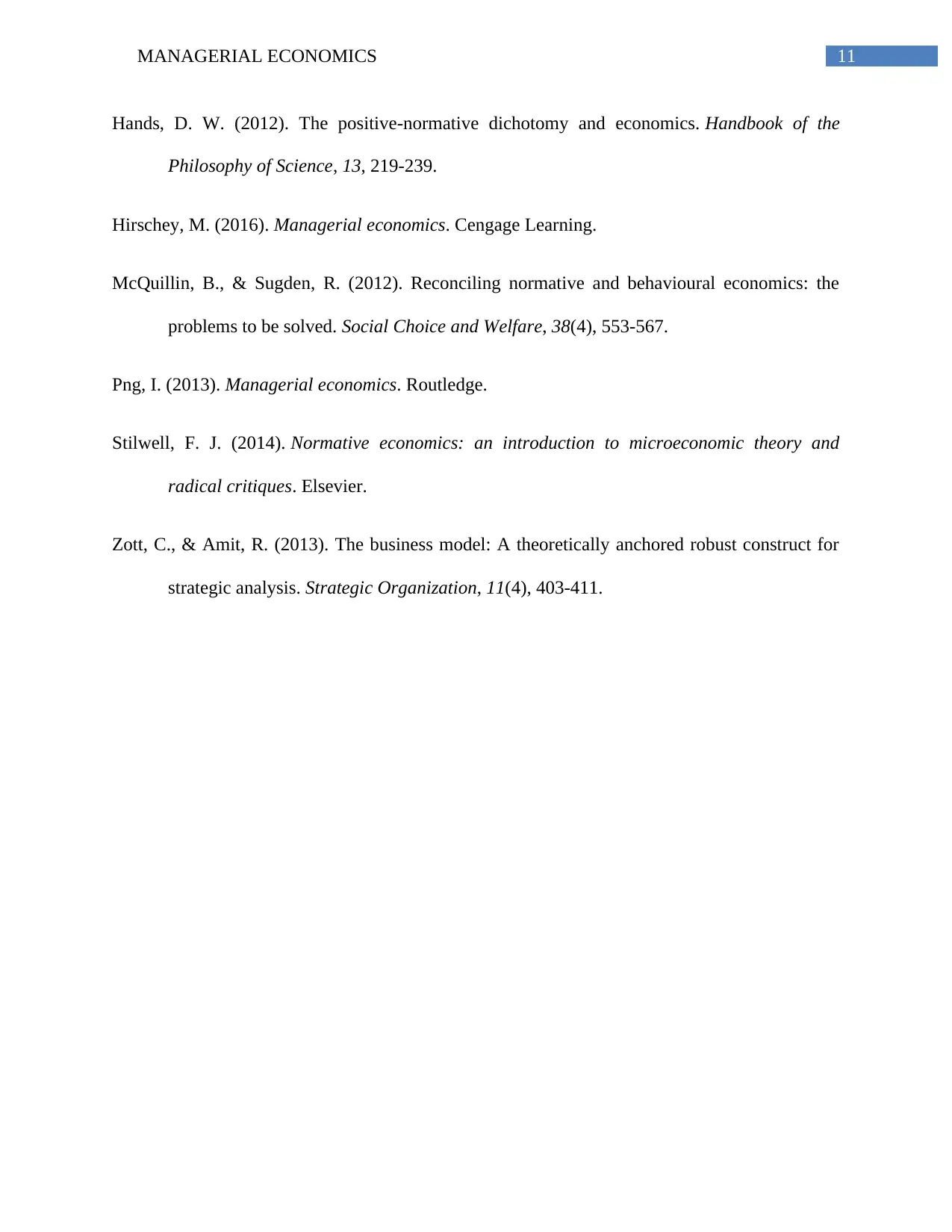
11MANAGERIAL ECONOMICS
Hands, D. W. (2012). The positive-normative dichotomy and economics. Handbook of the
Philosophy of Science, 13, 219-239.
Hirschey, M. (2016). Managerial economics. Cengage Learning.
McQuillin, B., & Sugden, R. (2012). Reconciling normative and behavioural economics: the
problems to be solved. Social Choice and Welfare, 38(4), 553-567.
Png, I. (2013). Managerial economics. Routledge.
Stilwell, F. J. (2014). Normative economics: an introduction to microeconomic theory and
radical critiques. Elsevier.
Zott, C., & Amit, R. (2013). The business model: A theoretically anchored robust construct for
strategic analysis. Strategic Organization, 11(4), 403-411.
Hands, D. W. (2012). The positive-normative dichotomy and economics. Handbook of the
Philosophy of Science, 13, 219-239.
Hirschey, M. (2016). Managerial economics. Cengage Learning.
McQuillin, B., & Sugden, R. (2012). Reconciling normative and behavioural economics: the
problems to be solved. Social Choice and Welfare, 38(4), 553-567.
Png, I. (2013). Managerial economics. Routledge.
Stilwell, F. J. (2014). Normative economics: an introduction to microeconomic theory and
radical critiques. Elsevier.
Zott, C., & Amit, R. (2013). The business model: A theoretically anchored robust construct for
strategic analysis. Strategic Organization, 11(4), 403-411.
⊘ This is a preview!⊘
Do you want full access?
Subscribe today to unlock all pages.

Trusted by 1+ million students worldwide
1 out of 12
Related Documents
Your All-in-One AI-Powered Toolkit for Academic Success.
+13062052269
info@desklib.com
Available 24*7 on WhatsApp / Email
![[object Object]](/_next/static/media/star-bottom.7253800d.svg)
Unlock your academic potential
Copyright © 2020–2026 A2Z Services. All Rights Reserved. Developed and managed by ZUCOL.




